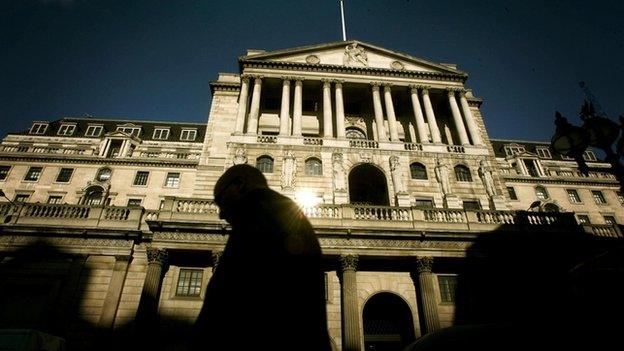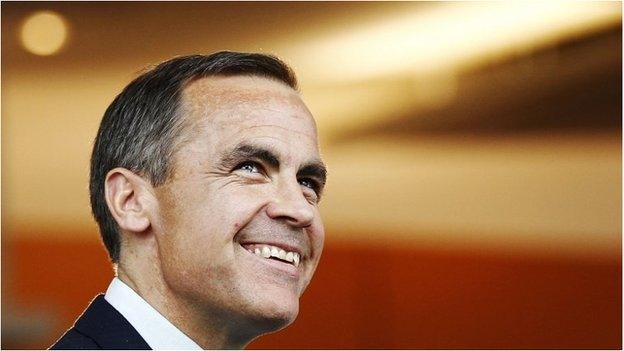The Carney conundrum
- Published

Mark Carney revealed on Wednesday that the Bank of England had made contingency plans ahead of the independence referendum
Horatio Townshend would, I suspect, have been horrified. Raising an elegant eyebrow, I reckon he would have demurred gently. Ditto Stamp Brooksbank. Although one could never be sure about Joseph Nutt.
Mostly, these former Governors of the Bank of England would, I feel, have preferred relative anonymity. A quiet word in carefully selected ears would have been the approach. Perhaps over drinks at the club.
These are different times. Today's Governor, Mark Carney, can expect to have his words quoted and, indeed, weighed. Even so, given the potential impact, he is cautious not to say too much.
And therefore, yesterday, Mr Carney stressed, once again, that he was offering no verdict whatsoever upon the choice facing the Scottish people in the referendum. The Bank, he said, would deal with the consequences of popular choice and political decision-making.
Yes, he said, there were contingency plans in place - in order to discharge the responsibilities of the Governor and the Bank "regardless of the outcome of the vote on the 18th of September."
However, he added in deliberately Delphic fashion: "It's never good to talk about contingency plans in public other than to assure that we have contingency plans."
Which brings us to questions to the first minister today - and more exchanges over the topic of the currency. You could almost sense Alex Salmond saying to himself: "Another day, another dollar". Or Euro. Or pound. Or…

Both sides of the referendum debate have taken heart from Mr Carney's comments
Today, though, Mr Salmond chose to counter-attack. Labour's Johann Lamont opened by arguing that there was confusion on the Yes side as to the prospective currency. She suggested that this was causing uncertainty in the markets, prompting the Governor's intervention.
Mr Salmond demurred (although a mite more robustly than was Horatio's custom.) Governor Carney's intervention was a perfectly sensible and modest measure, designed to calm markets.
And the source of that market disquiet? "The United Kingdom Westminster parties" who had, according to the FM, "a vested interest" in stirring things up.
For her part, Ms Lamont reckoned that Mr Salmond required a "reality check". The source of the problem was the independence offer. No campaigners were entitled, she argued, to point out flaws in that prospectus.
We were then treated to quote wars. Combat by citation. Mr Salmond offered Anton Muscatelli, the Principal of Glasgow University, as suggesting that it would be in the best interests of Scotland and the remainder of the UK to continue to share the pound.
Ms Lamont said she would be there all day if she listed Mr Salmond's critics. It was perhaps, then, just a little inopportune that her first name was John McFall. Yes, he was the esteemed former chair of the Commons Treasury Committee. But, as Alex Salmond pointed out, Lord McFall was also a Labour MP for many years and thus one of Ms Lamont's chums.
Cue jeering from the SNP benches. Ms Lamont rallied well to note that she was obliged, on occasion, to refer to people who did not agree with the first minister.
Both Ruth Davidson and Willie Rennie joined in, arguing that the talk of capital flight was driven by the prospect of independence and uncertainty over the currency. Mr Salmond told both that any uncertainty was created by the stated refusal of the pro-Union parties to accept the proposal for a sterling zone.
Each quoted Mark Carney, drawing contrary conclusions. As ever, the people will choose.